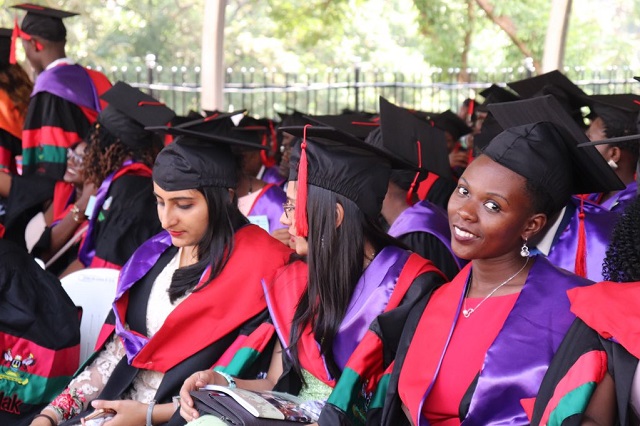
Kampala, Uganda | THE INDEPENDENT | Universities and other tertiary institutions have been caught off guard regarding expired programs, according to Prof. John Robert Ikoja-Odongo, the vice chancellor of Soroti University. The recent controversy arose when the University of Bristol in England rejected an application for a graduate program on the grounds that her undergraduate Biomedical Laboratory Technology degree program at Makerere University had expired.
This incident has caused concern and anxiety among students, alumni, and administrators in both public and private educational institutions nationwide. Prof Ikoja-Odongo says there is a need to have a moment of truth by universities, including the one he leads, regarding adhering to the guidelines and regulations set by the National Council for Higher Education regarding program reviews and reassessment.
The academician acknowledges that all vice-chancellors are fully aware of the requirement to review programs periodically to ensure their relevance and alignment with the needs of the workforce. He, however, admits that universities often overlook the task of reviewing their programs once the accreditation period has expired.
Based on the information at hand, the National Council for Higher Education grants accreditation to a program and allows for additional years for review and re-assessment before undergoing further evaluation. A recent statement issued by NCHE emphasizes that institutions are mandated to resubmit their programs every five years (for masters, bachelors, and diplomas) and every ten years for PhDs.
“Expiry of accreditation means that the program needs re-assessment to establish whether the key aspects upon which accreditation was granted are still in place,” the statement posted on NCHE’s website on May 22 reads in part.
The reassessment process, among other factors, evaluates the relevance of the program content to the market and the nation, compliance with minimum standards, the quality of graduates, and adherence to the program design, including content, contact hours, teaching methods, and assessment. It is worth noting that the procedure for program re-accreditation is not only recognized nationally but also adheres to internationally accepted standards.
This is why reputable universities, such as the University of Bristol in England, consult with higher education regulators, as seen in this case. Additionally, universities, even employers, at times require applicants to provide verification documents from higher education regulators in the countries where they have studied. This ensures the authenticity of the institution and the program they have completed.
Ikoja-Odongo further emphasizes that, as part of the normal process, universities should have quality assurance mechanisms to ensure that faculty members regularly review the curriculum. According to him, the curriculum can be updated by approximately 15 percent each year. By the time the reassessment period approaches, significant progress would have been made toward a comprehensive full review of the course.

In a recent communication addressed to the staff members, Makerere University Vice-Chancellor. Prof. Barnabas Nawangwe also acknowledged that the problem of expired programs can be partially attributed to the university itself. “On our side, there have been unacceptable delays in the review of some programs by departments, schools, and colleges, and occasionally at the Senate level for re-accreditation as required by law,” his communication addressed to all Members of Staff of Makerere University reads in part.
Professor Nawangwe also emphasized the importance of cleaning up their own institution, stating that colleagues with programs whose accreditation has expired have been notified by the Academic Registrar and given a deadline to submit the reviewed programs. He admitted that Makerere University did not have a system in place to track the expiry of program accreditations, resulting in some programs being overdue for accreditation by up to six years.
“This is simply unacceptable. However, the Academic Registrar has now developed a database on the status of the accreditation of our programs. All the responsible colleagues should monitor the accreditation of programs under their jurisdiction in order to avoid a repeat of this embarrassing situation,” he noted. At Makerere University, several staff members, who preferred to remain anonymous, attributed the expiry of the programs to poor management within the institution.
They claimed that the administration’s focus has shifted away from critical matters, such as the one at hand, and instead prioritized nominal issues. “This issue didn’t come out of nowhere. Some of us have been raising concerns internally about the expiring programs, but excuses related to finances have been put forward. However, recently, the university has been organizing numerous ceremonies and functions, spending billions. What are the priorities here?” one staff member commented in disbelief.
According to other staff members, this incident has tarnished the reputation of the institution, and it may take a considerable amount of time to recover from the damage. They believe that the situation could have been prevented if the management and administrators were fulfilling their responsibilities effectively. While University leaders like Nawangwe and Odongo accept their own failure in addressing the issue, they also raise concerns about the National Council for Higher Education.
They question the delays in processing program accreditations and updating the NCHE websites, which may have contributed to the overall problem. Ikoja-Odongo, for example, argues that his university submitted programs for reassessment several years ago, but the National Council for Higher Education has not taken any action on them and still displays these programs as expired.
While certain university leaders have taken responsibility for their shortcomings, others which are mostly private have adopted a defensive stance, attributing the issue to the slow processes at the NCHE. Some private universities whose programs are labeled as expired on the NCHE website have since employed public relations strategies to insist that their programs are still valid.
Additionally, there are those who claim that their programs expired during the COVID-19 pandemic and have recently commenced internal processes to reassess and rectify the situation. However, some individuals are raising concerns about the adequacy of the current re-assessment mechanism itself. Prof Mouhamad Mpezamihigo, the Vice Chancellor at Kampala International University-KIU, for instance, highlighted that in the Vice Chancellors forum, numerous members have contended that the process lacks a stronger alignment with laws, regulations, and practical circumstances.
Prof Mpezamihigo added that once a program receives accreditation, there can be regular internal reviews of the curriculum. According to him, the NCHE and professional bodies where required, can over time carry out checks on whether the standards are still being upheld.
Meanwhile, our reporters have discovered that due to the alarming nature of the issue, vice-chancellors are planning to convene and discuss the matter amongst themselves before collectively approaching the NCHE with a unified perspective on how to address the situation. Our reporter had not yet received an official comment from the NCHE regarding the issue and its potential impact on individuals who graduated from accredited institutions from the expired programs by the time of filing this story.
However, a council source informed our reporter that the matter has been a subject of discussion over the years, and certain universities, particularly those considered big, had chosen to disregard it. According to the available information, a significant number of programs, over 1,470, have expired in both public and private academic institutions over the past five years.
The expired programs encompass both graduate and undergraduate courses, with varying expiration periods depending on the specific academic institution. Many of these programs have expired for at least five years, yet universities have continued to admit students contradicting the regulations set forth for higher education. Some institutions have programs that expired more than a decade ago, while there are others that currently have no programs under review.
*****
URN
 The Independent Uganda: You get the Truth we Pay the Price
The Independent Uganda: You get the Truth we Pay the Price



